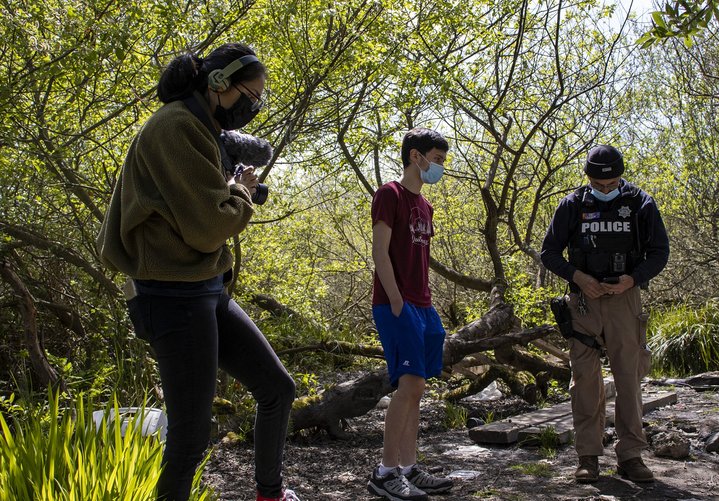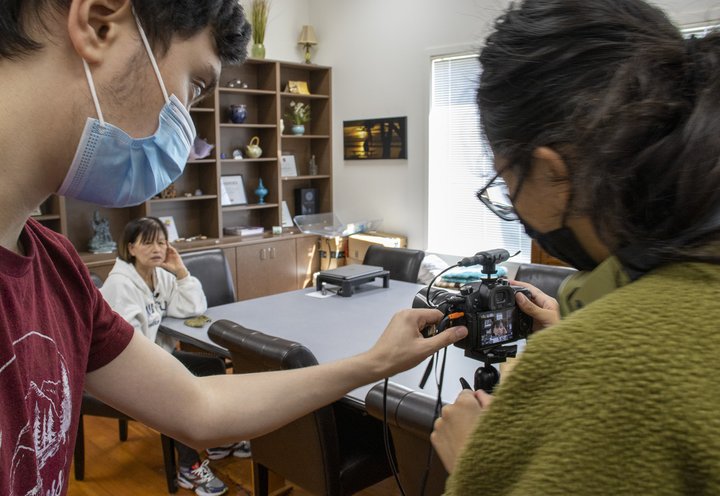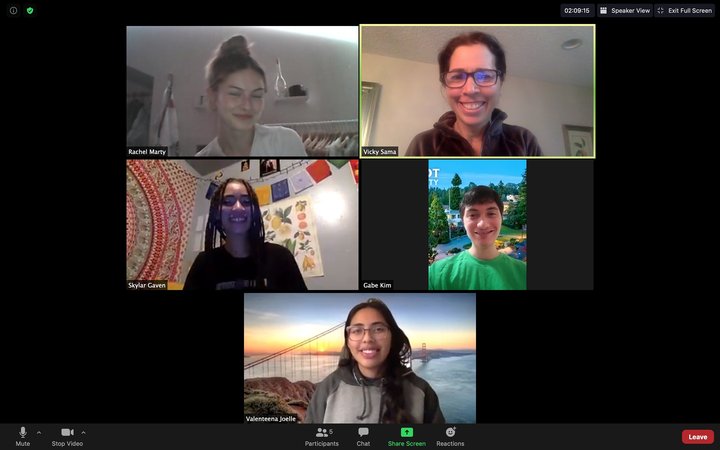
Executive producer Valentina Dimas and director Gabe Kim on the scene of a homeless camp with Parks-Waterfront Ranger Dennis Gagnon of the Eureka Police Department’s Community Safety Engagement Team (CSET). | All photos courtesy Gabe Kim.
###
Recent HSU graduate Gabe Kim says he and his filmmaking partners had one overarching goal with their “Homeless in Humboldt” video documentary series: “We just wanted to tell people’s stories,” he said in a recent phone interview.
Last Friday the filmmakers published their project’s first installment, a 16-minute episode that follows JP Urich and his wife Caity Jo as they navigate the hardships and indignities of living homeless on the outskirts of Eureka. The two talk frankly about their feelings of helplessness and stress. They discuss the relationship between homelessness and substance use, and they open up about Caity Jo’s stomach cancer diagnosis.
The filmmakers also interview Eureka Police Officer Dennis Gagnon, who works as the parks and waterfront ranger with the department’s Community Safety Engagement Team (CSET), and a pair of attorneys from the Humboldt County Public Defender’s Office who discuss the uneven scales of American justice.
“I think at every stage in the process, being homeless disadvantages you in our legal system,” public defender Wade Orbelian says in the episode.

Kim and Dimas prepare the camera for an interview with Betty Chinn, Eureka’s renowned homeless services provider.
Kim, who graduated in May with a bachelor’s degree in journalism, said he initially planned to make a documentary as part of The Humboldt COVID-19 Community Archive Project, which aims to document the local impact of the pandemic for future generations.
Fellow journalism major Skylar Gaven, with whom Kim worked at HSU’s student newspaper, The Lumberjack, came up with the idea of focusing on the local homeless population. Their production crew includes fellow students Valentina Dimas and Rachel Marty.
Once the team started working on the project, however, they realized that the pandemic wasn’t exactly the No. 1 concern of their subjects.
“COVID-19 was one of the last things on homeless people’s minds when you consider everything else they have to factor in — where to sleep, what to eat, how live day by day,” Kim said.
So instead of shoehorning the subject to fit with a COVID-19 theme, the student filmmakers chose to simply listen to their interviewees.
“Most of us do not have a background in documentary filmmaking,” Kim said. “We’ve been kind of learning how the whole process works going along. But it’s been an incredible experience.”
They’ve been helped through the process by faculty advisor Vicky Sama, chair of HSU’s Journalism and Mass Communication Department. They’ve also gotten input from professionals who work with the local homeless population. Brittany Powell, public information officer for the Eureka Police Department, put the students in touch Sgt. Leonard LaFrance, who connected them with Gagnon. Gagnon, in turn, suggested they interview JP and Caity Jo.
Dimas — who is credited as an executive producer on the project, though by all accounts the four-person crew works collaboratively on all virtually aspects of production — said the documentary series wound up being “one of the best things I ever decided to do.”
Interviewing local homeless people taught her the value of being an active listener and made her realize how vulnerable most people are to becoming homeless themselves.
“I hope this project inspires students and peers of the younger generation to be curious about their homeless neighbors, even saying a quick hello or asking how they’re doing and [maybe] offering up some extra food,” Dimas said. “The project, I don’t know if it has changed the homeless situation in Humboldt, but I just hope it helps bridge gaps of empathy that I think we are missing.”

The student filmmakers in a Zoom meeting with faculty advisor Vicky Sama.
Marty, who is set to graduate in spring with a degree in journalism, said this project has changed her perspective on the local homeless population.
“These are people that sometimes don’t even get a second glance on the street, and we’ve gotten to know them and see what they go through,” she said. “It’s heartbreaking.”
Like Dimas, Marty said the project has convinced her that the public should try to be more empathetic toward the houseless. “They’re people, and they lose that humanity,” she said.
Gaven, who was familiar with the problems associated with homelessness from growing up in San Diego, said that while working on this documentary series she realized that video editing is something she’d like to pursue as a career path. “It definitely is a passion of mine now,” she said.
Originally pursuing a degree in environmental studies, Gaven switched to journalism after taking a course in video production, and she said she believes this medium has immense storytelling power.
“This was a great way to really show people these issues,” she said of “Homeless in Humboldt.” “I’ve always wanted to express that to an audience and hopefully spread awareness. … I’m so appreciative of the people who are willing to share their life with us. There have been times when I’ve almost cried; it’s just one thing after another. They can’t get a break, especially with COVID.”
The students (or former student, in Kim’s case) are currently working to produce a second part of the JP episode, after which they will begin work on a new segment following another local homeless couple, Angela and Will.
They filmmakers are still working with faculty advisors, but Gaven said they’re no longer sure how — or if — the project will earn them credits or tie into their coursework.
“To be honest, I feel like we’ve kind of taken this as our own project,” she said. “I think we made it our own project.”
And she echoed her collaborators’ sentiments about the importance of empathy toward the homeless.
“There’s just so much you can learn from them, that I’ve learned from them,” she said. “They’re just really great people … . You should really get to know somebody before you start judging.”
Watch the first segment of the “Homeless in Humboldt” documentary project below.
###
CLICK TO MANAGE